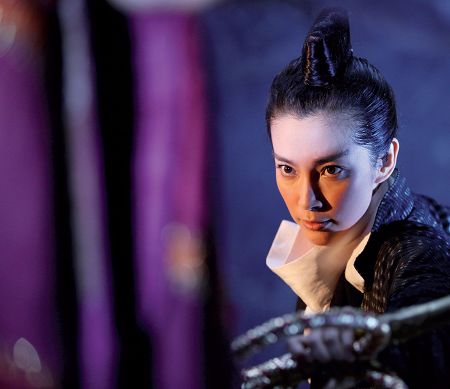Deconstructing Detective Dee
Hong Kong director Hark Tsui has just returned from the 67th Venice Film Festival, where his latest work Detective Dee and the Mystery of Phantom Flame premiered as one of the 24 Competition entries. With the film opening in China on September 29, he talked exclusively with the Global Times about the film, its characters, and why and how he made yet another wuxia (wu as martial arts and xia meaning chivalrous) film.
|
A scene from Detective Dee and the Mystery of Phantom Flame. [Global Times] |
"Wuxia is a unique and romantic way for Chinese directors to tell a story," Tsui said, adding that he has a special passion toward the genre, which is like a Chinese poem reflecting the core of Chinese culture.
According to the director, who has made numerous wuxia classics such as the Wong Fei-hung series and New Dragon Gate Inn, Chinese wuxia culture has a history of more than 1,000 years, originating from wuxia literature in the Tang Dynasty (618-907). "There have been many representative characters and valuable thinking emerge during the genre's long history, which constantly inspire Chinese directors, including myself, to make wuxia films to express our understandings of the culture."
Tsui admitted frankly that he was at first a bit surprised that such a commercial film as Detective Dee and the Mystery of Phantom Flame was selected for Venice, a festival known for its artistic emphasis. However, after attending the festival and speaking with foreign audiences and critics, he realized that his wuxia film might be more "spiritually inspiring" to overseas audiences than he originally intended.
"It is surprising and encouraging to see how strongly foreign audiences are attracted by and able to understand wuxia films," Tsui said. "It is more than just exotic appeal it's culture that they can now relate to."
He added that another reason why Detective Dee and the Mystery of Phantom Flame was selected to compete in Venice and why international audiences enjoyed the work is that the film is set in the Tang Dynasty, a time similar to present day China both culturally and socially.
"The Tang Dynasty was a unique time period during China's long history, whose development level and international status could only be compared with that of present day," explained the director, who has more than once shot films set in the dynasty. He concluded that foreign audiences who are curious about modern-day China are interested in watching a film set in a similar cultural and social background.
Detective Dee and the Mystery of Phantom Flame centers on a household detective, Dee Renjie (Andy Lau) and China's first female emperor Wu Zetian (Carina Lau). A giant Buddha pagoda is under construction in the Tang capital Luoyang, the completion of which will see Wu formally ascend the throne. However, a series of unexplained spontaneous combustions in public is threatening her rise to power. Determined to solve the case before her ascension, Wu turns to an unlikely candidate, Dee, who was previously arrested and imprisoned for criticizing her seizure of power following the death of the emperor.
Tsui recalled having watched many Western detective films while growing up, like Sherlock Holmes films and it finally occurred to him that there had been few such detective figures on Chinese screens.
"I feel like it is such a waste not to make detective films when we have really amazing detectives in history like Dee, instead of the fictional Holmes," He said.
 0
0 








Go to Forum >>0 Comments